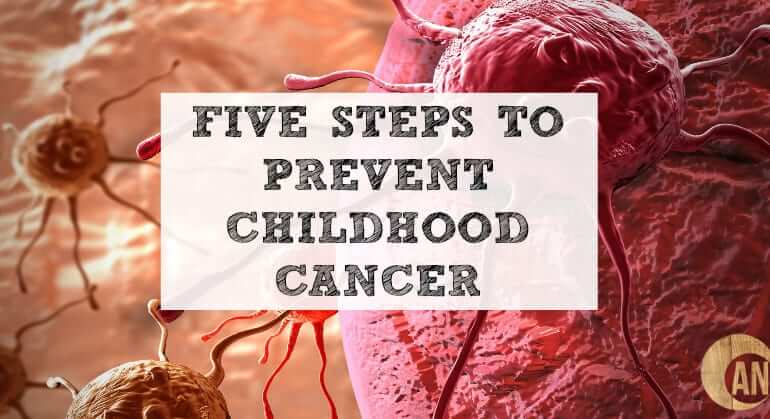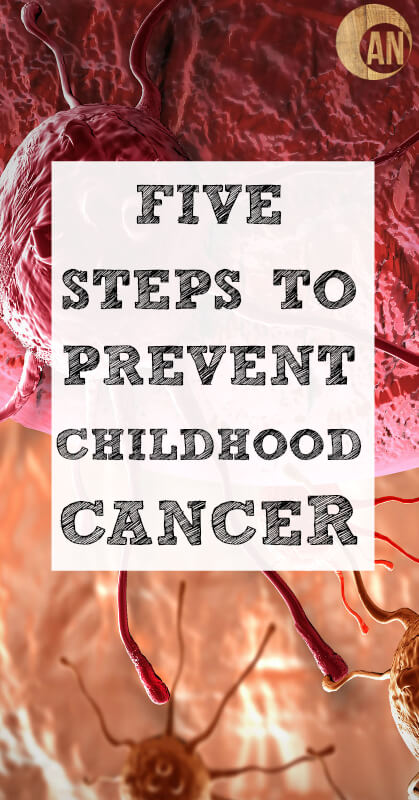
I can only imagine how heartbreaking and terrifying it is to have a child diagnosed with cancer. My heart goes out to every family that has been affected by cancer, childhood cancer or otherwise. I recently read that cancer is the leading cause of death by disease in children from 1 to 14 years-old so I thought it would be a good idea to discuss cancer prevention. Of course, sometimes a person does everything right and it can happen anyway, but we can still do our part as parents and potential parents to try to prevent cancer. While I am not a parent yet, considering that we will likely have kids within the next five years, there are certain steps I plan on taking to make sure my offspring are as healthy as can be.
A number of studies are examining suspected or possible risk factors for childhood cancers, including early-life exposures to infectious agents; parental, fetal, or childhood exposures to environmental toxins such as pesticides, solvents, or other household chemicals; parental occupational exposures to radiation or chemicals; parental medical conditions during pregnancy or before conception; maternal diet during pregnancy; early postnatal feeding patterns and diet; and maternal reproductive history. Source
Go Organic
Pesticides are used in agriculture production to spray crops, but can also seep into air, water, and even be used in gardens. Pesticides, while often touted as safe, are actually carcinogenic. This is why it is so important to buy organic, and if possible, grow your own food. From the Occupational Epidemiology Branch at National Cancer Institute in Rockville, Maryland,
Parental exposure {to pesticides} during the child’s gestation or even preconception may also be important. Malignancies linked to pesticides in case reports or case-control studies include leukemia, neuroblastoma, Wilms’ tumor, soft-tissue sarcoma, Ewing’s sarcoma, non-Hodgkin’s lymphoma, and cancers of the brain, colorectum, and testes. Although these studies have been limited by nonspecific pesticide exposure information, small numbers of exposed subjects, and the potential for case-response bias, it is noteworthy that many of the reported increased risks are of greater magnitude than those observed in studies of pesticide-exposed adults, suggesting that children may be particularly sensitive to the carcinogenic effects of pesticides.
Pesticide exposure doesn’t even take into account the use of GMOs, which have also proven to be carcinogenic, you can read more about that HERE.
The EPA has also stated “that pesticides can cause health problems, such as birth defects, nerve damage, cancer, and other effects that might occur over a long period of time.” This is why it is so important to not only feed your child organic food, but to eat organically as well. If the mother is exposed to pesticides, from eating them or otherwise, the baby is also directly affected.
Preconception Diet/Overall Healthy Diet
If possible, it’s best to prepare for pregnancy a year to six months prior to getting pregnant. A preconception diet includes eliminating harmful, toxic and processed foods while focus on nutrient dense foods like pastured meat and dairy, wild seafood, liver, bone broth, fermented foods and pastured eggs. Eliminating the toxins will help your body detox, while eating these nutrient dense foods will ensure that the baby is healthy once conceived. Don’t forget that the body uses the food we eat to make the baby, and baby needs vitamins B12, A, C, E, D as well as a full spectrum of minerals.
While preparing to have a baby and while you are pregnant, you should be eating extremely healthy foods, not junk foods. Think of it this way, if you want a healthy baby, eat healthy foods. Because eating junk food will set the baby up for health issues.
Likewise, you want to make sure your child is getting the best nutrition. So many children are bombarded with kids menus, junk food and food that is overall unhealthy. Kids should eat normal food that their parents eat. They don’t need chicken nuggets, pizza and mac and cheese for every meal. For more info, check out the ideal diet for kids.
Limit Toxin Exposure
This doesn’t just apply to pesticides, it also applies to toxic household cleaners as well as toxic body products and makeup. A common ingredients in makeup and body products, parabens, has been found in cancerous tumors. Here is a list of common and dangerous household chemicals that have carcinogenic properties. According to the Environmental Working Group,
Common cleaning ingredients can be laced with the carcinogenic impurity 1,4-dioxane. Independent tests have detected the presence of 1,4-dioxane in numerous name-brand cleaning supplies. Other products contain preservatives that release low levels of cancer-causing formaldehyde.
If Possible, Avoid Antibiotics
Of course there are times when antibiotics are necessary, but I know far too many people who opt for antibiotics anytime they have a cold, flu or illness (which makes no sense because they are viral, not bacterial). Not only does this destroy beneficial gut bacteria, but it makes you more susceptible to building a tolerance to antibiotics. Consider this, the body utilizes the immune system to fight cancer. The immune system is mostly comprised of the gut, the gut needs beneficial gut flora to thrive.
The overall indication is that gut microbial communities play a key role in the development of inflammatory disease and that these communities are amenable to manipulation to prevent or abrogate disease development. As the GI microbiome and specific pathways responsible for improved host health continue to be identified with newly developed high-resolution culture-independent tools, our understanding of the delicate balance between the human host and its microbial inhabitants continues to unfold. Source
To improve and maintain gut flora, eat fermented foods, take a probiotic, reduce sugar, grain and vegetable oil intake. Don’t eat processed foods!
Avoid Unecessary and Dangerous Prescriptions
This sort of goes hand in hand with the above. A friend of mine is experiencing hair loss; after a visit with her doctor, she walked out with a prescription for Xanax. She’s not stressed, depressed or experience anxiety. Why was she given such a dangerous prescription? Unfortunately, sometimes doctors prescribe unnecessary prescription drugs that can do more harm than good.
A surprising number of other prescription medications have warnings in their labels about cancer. For example, the popular heartburn medicine omeprazole (Prilosec) causes abnormal cell growth and stomach tumors (carcinoids) in rats. No one seems to know whether this constitutes a problem for people. Spironolactone (Aldactazide, Aldactone) is a blood pressure medicine that is sometimes prescribed for hormonal imbalances and facial hair growth in women. It causes tumors in rats. Parents of children with eczema have been worried by reports that the prescription topical skin treatments, Elidel cream and Protopic ointment, are associated with lymphoma and skin cancer. The FDA has warned against using these drugs in children under two years of age. It also states that, “The long term safety of Elidel and Protopic are unknown.” Source
Let me reiterate that of course we cannot prevent all cases of cancer, even if you do everything right. Cancer is no one’s fault. The best we can do is try to prevent it by living a healthy, non-toxic lifestyle.

Sources:
http://www.cancer.gov/cancertopics/factsheet/Sites-Types/childhood http://www.ncbi.nlm.nih.gov/pubmed/9646054 http://www.epa.gov/pesticides/food/risks.htm http://www.ewg.org/guides/cleaners/content/cleaners_and_health http://www.ncbi.nlm.nih.gov/pmc/articles/PMC2881665/ http://www.peoplespharmacy.com/2008/10/20/do-prescription-1
Original article and pictures take ancestral-nutrition.com site
Комментариев нет:
Отправить комментарий